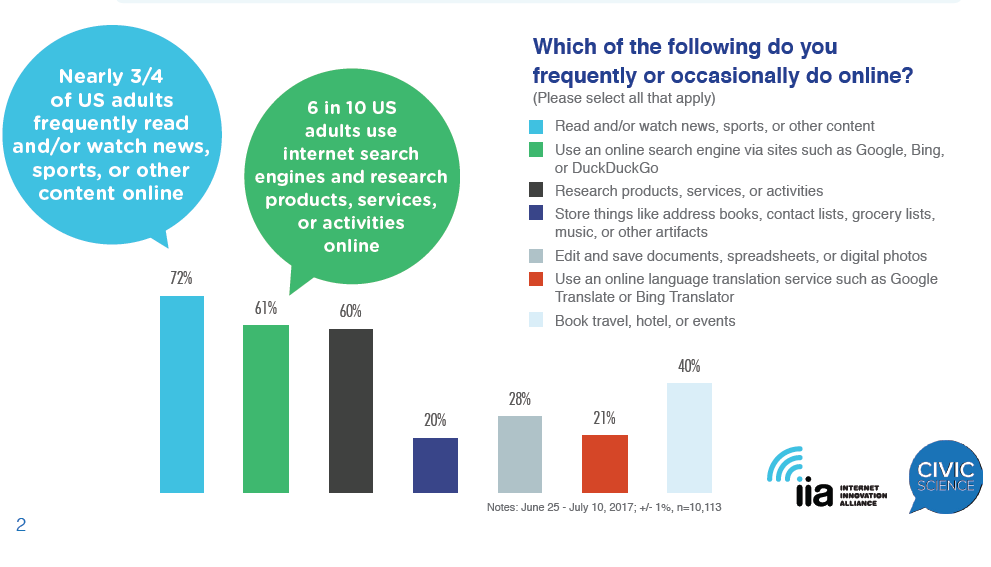IIA Survey Says: Public Uses 'Net as Information Service

The smarter way to stay on top of broadcasting and cable industry. Sign up below
You are now subscribed
Your newsletter sign-up was successful
The Internet Innovation Alliance says that a survey it commissioned concludes that consumers use the internet primarily as an information service.
That came in comments to the FCC on Chairman Ajit PAi's proposal to reclassify internet access from a Title II telecommunications service to a more lightly regulated Title I information service. The FCC had asked for input on how people use the internet. Comments are due Wednesday, Aug. 30.
The survey found that a majority of the respondents said they used the net to get information, like reading and or catching up on the news and sports (71%), searching for information via Google or Bing or other engines (61%), or researching products or services (60%).
Related: Gigi Sohn: Aug. 30 Could Signal Closing of Open Internet
The poll, conducted online by CivicScience, was of at least 10,000 U.S. adults 18 and older.
IIA says the poll "reaffirms the FCC’s assumptions that broadband, is by definition, an information service."
“The Commission should act promptly, restoring the correct legal understanding of broadband, reviving the bipartisan common-sense agreement under which the internet grew and flourished, and opening the way to the next generations of investment and innovation,” said IIA Honorary Chairman Rick Boucher, former Democratic chairman of the House Communications Subcommittee.
Related: More Net Neutrality Billboards Go Up
IIA also wants Congress to step in and clarify the FCC's authority and resolve the long-standing information service/telecommunications service debate. "IIA reiterates its call for Congress to pass bipartisan legislation to ensure permanently an open Internet that protects consumers, innovation, and investment in the Nation’s high-speed broadband networks," Boucher said.
IIA argues that rolling back Title II will boost investment and lead to faster and more reliable broadband service, having argued that treating ISPs as common carriers subject to nondiscriminatory access provisions and potential rate regulation did not.
Under then chairman Michael Powell, the FCC in 2002 declared that internet access (referred to as cable modem service) was an information service, and did not have a separate telecommunications service element that brought it into the Title II common carrier ambit.
The FCC concluded that because cable does not offer Internet access service separate from its information services (email, for example), that access service cannot be separately regulated as a common carrier service. It also invoked the government's interest in promoting the widespread roll-out of broadband to support its decision.
The FCC extended that definition to phone Internet access (DSL at the time) soon after.
That cable modem service classification decision was upheld in 2005 by the Supreme Court in the Brand X decision. But the late Justice Antonin Scalia delivered a memorable dissent in which he likened the majority's decision to concluding that a pizzeria was justified in answering the question of whether it offered delivery service, with: "No, even though we bring the pizza to your house, we are not actually ‘offering’ you delivery, because the delivery that we provide to our end users is ‘part and parcel’ of our pizzeria-pizza-at-home service and is ‘integral to its other capabilities.’” Scalia said any reasonable customer would conclude the other party was either crazy or following "too clever by half" legal advice.
"Despite the Court’s mighty labors to prove otherwise," said Scalia, "the telecommunications component of cable-modem service retains such ample independent identity that it must be regarded as being on offer–especially when seen from the perspective of the consumer or the end user."
That pizzeria, or borrowing another analogy, "it's a breath mint, it's a candy mint," debate has continued to this day.
Internet Innovation Alliance members include AT&T and broadband plant suppliers Alcatel-Lucent and Corning.
The smarter way to stay on top of broadcasting and cable industry. Sign up below
Contributing editor John Eggerton has been an editor and/or writer on media regulation, legislation and policy for over four decades, including covering the FCC, FTC, Congress, the major media trade associations, and the federal courts. In addition to Multichannel News and Broadcasting + Cable, his work has appeared in Radio World, TV Technology, TV Fax, This Week in Consumer Electronics, Variety and the Encyclopedia Britannica.

